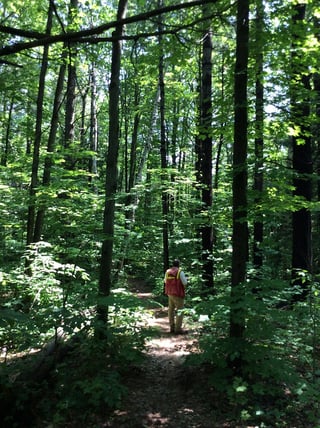Forests are complex and the number of things you'll need to consider as a landowner can be overwhelming. It is often helpful to connect with a forester to help explore your options and make sure you are able to get the right work done at the right time.
 Despite what some may tell you, forestry is a blend of art and science. A forester's work is to understand the natural ecosystem and then figure out how to achieve a landowner's goals on that land. From accessing timber resources sustainably to protecting wildlife, building recreation amenities, and even improving aesthetics, a forester has to give advice to achieve a good balance of all these objectives.
Despite what some may tell you, forestry is a blend of art and science. A forester's work is to understand the natural ecosystem and then figure out how to achieve a landowner's goals on that land. From accessing timber resources sustainably to protecting wildlife, building recreation amenities, and even improving aesthetics, a forester has to give advice to achieve a good balance of all these objectives.
Foresters are trained to understand how different parts of your woods (the trees, wildlife, soils, water, etc) interact and how they can be nurtured in a way that meets your needs. Foresters are also familiar with local laws, know what markets exist for different forest products and services, and can help manage the legal and financial aspects of woodland-associated activities. With their technical expertise, you can accomplish more on your land than you might be able to alone, and you'll be less likely to make expensive mistakes.
There are at least four key times when you should think about hiring a forester:
- During an initial assessment and valuation before you acquire the land
- When you plant trees
- When you thin or harvest trees
- When you want to improve wildlife or water quality on your land
The decisions you make at these times are crucial to the long-term health of your woods and it makes sense to invest in a forester's advice.
For example, when you are thinking about a timber harvest, a forester can:
- Inventory and appraise your timber stands
- Project forest growth and future value of the standing timber
- Determine which trees should be cut now
- Market the timber to make sure you're getting a fair price
- Recommend a logger who has the right gear and experience for the work you want to be done
Many landowners also get foresters to put together a more comprehensive management plan. A good plan will usually include an inventory, identification of key habitats, a clear description of your objectives and strategy for achieving them, and a near-term action plan. Implementing a plan likely also means the forester will help you with boundary lines, road building, and improving wildlife habitat.
Some landowners formalize their forester connection over a long-term property management agreement. Much like a pediatrician takes responsibility for the health of your children, including wellness checks, vaccinations, early detection, and treatment of illness, a forester can monitor your woods and guide you through the actions to keep your forest healthy.
The most important thing to remember when hiring any service professional is that they will be working for you. So make sure to choose someone that listens to you, understands what you need, and with whom you can build a good working relationship. It's not uncommon for a good forester relationship to start with a single project, and develop into a long-term connection with the land as it passes from one generation of owners to the next.
This is an important role and so it's always important to check a forester's qualification. Ask if they are registered with a professional association and don't be afraid to check education credentials and references. A good forester will also carry appropriate liability insurance.
If you are ready to find a forester start by asking your friends and neighbors to suggest someone they have worked with. If your property is located in Maryland, Pennsylvania, West Virginia, Vermont, Massachusetts, or New York; WoodsCamp can also help you connect with a local network of foresters who can help get you enrolled in qualifying programs.



We want to hear from you.